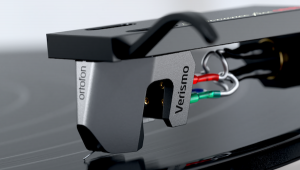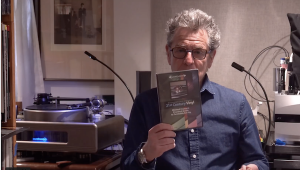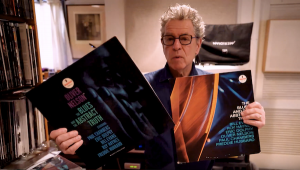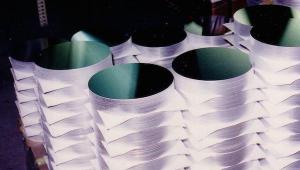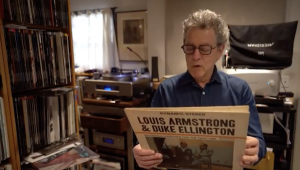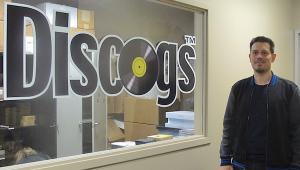Smashing Records At PortalSpaceRecords, The Reconstituted EMI Pressing Plant
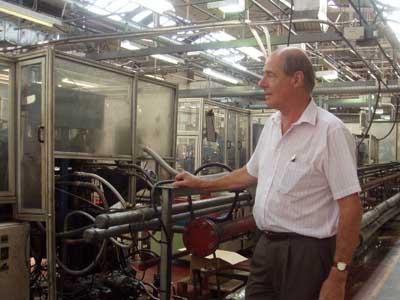
What I found did not quite live up to my tingly expectations, though admittedly I hallucinated images of mid-sixties LP production at the storied original EMI plant, which had long since been demolished.
Instead, I was ushered into an unglamorous-looking contemporary corrugated aluminum building, headquarters not of EMI but an outfit called PortalSpaceRecords.
Inside the rubble-strewn facility I found a few forlorn presses operating but compared to what I’d seen at RTI’s humming Camarillo, CA facility a few years before, what I saw at Hayes-Middlesex was anti-climactic to say the least.
That is, until I spent some time with the plant’s manager, Roy Matthews. Mr. Matthews managed the original pressing plant for EMI. What’s more, he helped design and build the presses and the plating facility, which is key to the whole process.
Mr. Matthews was reeled in from retirement by the lure of restarting his beloved machinery and pressing vinyl in the 21st century, something he later told me that he never saw coming.
So while I was happy back then to see vinyl being pressed in Hayes-Middlesex and I was heartened to see Mr. Matthews back doing what he loved, I was disappointed to find it was not by EMI but by an independent company called PortalSpaceRecords in a rubble strewn space owned by some businessmen more interested, it seemed to me, in a tax dodge than in the wonders of vinyl.
Five Years Later!
When I returned this year (2006) I found a much different facility, one that was humming at full capacity. The number of presses in operation had tripled, the plating facility had grown to meet the presses’ demands, orders were being fulfilled, shelves packed with completed orders in the form of archived nickel plated lacquers lined a wall, and near the loading dock I found women slipping heavy vinyl into jackets for an EMI order of 9000 LPs for a reissue of George Harrison’s "Living In The Material World".
I was ushered into Mr. Matthews’s office by an assistant and given a seat next to his desk where I couldn’t help but read two printed out emails, one from Reference Recordings requesting a few examples of the plant’s pressings. So here’s a scoop: Reference is considering returning to the vinyl business! That’s good news indeed, as many of Reference’s all-analog recordings deserve to be heard by a new generation of analog devotees.
Then I noticed a second email from an Australian correspondent, from which I gleaned that Mr. Matthews and PortalSpaceRecords had establishing a vinyl “beachhead” there, helping some Aussies set up a small pressing operation “down under” using spare EMI presses.
When Mr. Matthews greeted me and sat down at his desk, I admitted my wandering eye. He didn’t appear to be upset. In fact, he was eager to fill in the details and that’s how the interview began. Be sure to take the “factory tour” posted elsewhere on the musicangle.com site—M.F.
Roy Matthews: The fellows owning this factory had contacts in Australia, saw a need there, I don’t think there are any manufacturers there now of vinyl, so we decided to get in the market, send the presses and the service equipment, and very fortunately, a chap who used to work for me many years ago when I was running (the EMI pressing plant), and as a young man I got him a job in the Australian plant, and we contacted him again, and he came, and he knew the press, had a lot to do with setting them up and he’s helped set this (Australian) plant up and it’s got off to a very good start.
Michael Fremer: And it’s probably the last thing he ever thought was going to happen!
RM: Absolutely! Absolutely! They thought it was all done and finished, as I did, I suppose.
MF: You know it’s like the EMT turntable, you know it?
RM: Yes, yes.
MF: So the EMT turntable…the company just put the arm back into production, the famous “Banana” arm…
RM: Yes, yes.
MF: And they found the gentleman who designed it and he had all the original tooling and he’s 85 and he never expected this and there’s a demand for it because it’s a legendary thing.
RM: I think a lot of us are (laughs) somewhat surprised.
MF: I think it’s the greatest. And it’s not just the older people who are buying the records, it’s the kids!
RM: Oh, no. It is the kids. I mean, the music may not be great but one thing the dance era has done is brought kids in to see what there is. They had no idea. It brought the turntable into the vision of the kids, alongside their MP3 players.
MF: Yea, and when they hear vinyl, they know!
RM: Oh, absolutely. That’s the best part.
MF: I always said, the worse it’s going to get…it’s like a whole generation was brought up with black and white television and you showed them high definition color they’d go WOW!.
RM: Yes.
MF: And you press “regular” music here as well, correct?
RM: We press just about everything. Absolutely. But certainly the major proportion of our business is current music of some kind or another, right across the spectrum from jazz, rock, punk, dance, rock and roll, soul.
MF: And are you pressing for major labels now?
RM: EMI, Warner, Ministry of Sound, we do a little for Sony/BMG.
MF: So you pressed the recent Eagles reissues?
RM: Yes.
MF: So how did those come out?
RM: Beautiful. Great records.
MF: I haven’t heard those. Do you know who mastered those?
RM: No, I don’t know offhand.
MF: So are we going to get The Beatles out on vinyl again, pressed here?
RM: I’m sure. We’re just pressing the George Harrison.
MF: Which one?
RM: Living In The Material World.
MF: And hopefully it was mastered from the original analog master tapes. When I was here last time, you were just starting up.
RM: Yes, that’s correct. That’s 5 years ago. And it took off almost instantly. And I think within six months we were up to having 6 presses in. We thought, well, that’s enough. And within the year we had 10. And we’re putting our 11th in now and we’ve got a few more at the back ready to come online.
MF: Thank God they didn’t dismantle and scrap all of this.
RM: Well, they scrapped most of them.
MF: Really? Well, it was huge at one point.
RM: Well of these here, I think, 4 we recovered from Greece, and I think a couple from Australia.
MF: No one’s going to invest to make new presses now.
RM: No. It would be very expensive, anyway. You couldn’t cover the investment.
MF: I know there’s a whole bunch of presses in America that were Mobile Fidelity’s presses, which they had gotten from Sweden, I think.
RM: Yes. Toolex presses.
MF: And I think those are just sitting around.
RM: Well, they generally get used these days, or someone snaps them up but we like our own machine.
MF: So how does the quality today compare to what was done in the ‘60’s?
RM: I would say the average is better; the best is the same.
MF: And how about the vinyl formulation?
RM: Very good. I’d say that’s better. It’s one of the things that’s better. It’s so consistent. The components, the resin components and the other chemical components are really excellent. The control is good, and the mixing’s brilliant. It’s so consistent we do not ever detect a change. We only go to one supplier, who is the only major supplier, now in France. And it’s excellent.
MF: Is the price getting high because of the oil?
RM: Well, oddly enough I just heard today that there is a price increase. It’s the first in two years. So it’s not been bad. It’s not been affected in the same way as, for instance, polycarbonate used for making CDs, which, I believe, has gone up considerably.
MF: Really.
RM: So it’s been reasonably stable. What’s affected us more in the price of fuel. Energy. Oil and gas. It’s just soared. Just about doubled in 3 years. And it’s a big bill. And we do still have the problem of low prices. We’re competing with people who constantly offer really cheap prices but with not necessarily good quality. It keeps us very tight but it probably doesn’t do us any harm.
MF: Well people who want to buy records now want quality except maybe for dance and scatching where it really doesn’t matter.
RM: Yes, that’s right.
MF: You only have one quality, right? You don’t have different quality for…
RM: No. I won’t do that.
MF: Even for scratching and stuff?
RM: No. I don’t really do audiophile either. I just do the best we can do. I prefer that. It’s very difficult to run two qualities in a factory. It’s very dangerous, in fact. It tends then to slide.
MF: So wouldn’t you say then that these 180 gram records you’re pressing are audiophile quality. I mean, what would distinguish them from audiophile quality?
RM: Well I think you’re talking about the difference between 99.5% and 100% really.
MF: How do you think your records compare to what comes out of Pallas in Germany?
RM: Oh, I think they compare very favorably.
MF: Because those are very good. And is the plating done here too?
RM: Yes. Oh, hes.
MF: I didn’t remember from last time.
RM: We consider that our strong area, our strength, quite honestly. That’s where the quality is. Good material. We buy the best. The presses are excellent and apart from that, it’s only the metal work that makes good or bad records.
MF: You know I forget to bring it, I’ll have to send you one. I made a DVD on how to set up turntables. And I interviewed George Marino at Sterling Sound. And there these famous “pink label” Island records, many of which were cut in New York at Sterling Sound.
RM: That’s right.
MF: By Lee Hulko.
RM: Yes.
MF: And so records like the first few Cat Stevens albums would be plated and pressed for A&M in California and the same mastering, the same cut, obviously a different lacquer, would come here, to wherever…
RM: They came to us, we did those.
MF: You did the Islands?
RM: Yes, EMI did the Islands.
MF: Oh, that’s right because I saw the matrix codes on originals. And the difference was huge. The sound quality here was so much better.
RM: Well EMI, they were very strong on their process control on metal work. We took the view that we took everything out of the hands of the operator and we just put everything into process control and we’ve inherited that. I mean my first job as an engineer was to do that. That was my task. It was all done by hand, the spraying and so on. And I was told to go there and make it so it’s out of the hands of people because the older chaps who had been doing it for forty years in those days were about to retire and you could see that the whole art, which it was, was about to go. And some of the stuff here, I drew and designed.
MF: Wow!
RM: Yea! Quite a lot of it. So that was my baby, that particular process and I still get a great pride in it and I still see it as the absolute kernel of everything we do.
MF: And again, you couldn’t have imagined this would happen again.
RM: No! Absolutely. So it’s really quite amazing.
MF: You were working at Abbey Road when Pink Floyd recorded Dark Side Of The Moon, correct?
RM: Yes, and in those days an LP took a couple of weeks to record, two weeks, so they were booked here and others were booked here. A lot of people wanted to go in. It was a lovely studio (just completed), and they didn’t come out. It was about three months, they just stayed there and stayed there. We’d never had people stay so long putting a thing together. Of course, we were waiting to see what was coming. And it was good!
MF: But no one expected it to still be popular 33 years later!
RM: No, but it still is and we still press it!
MF: And you pressed the recent David Gilmour album On An Island? Beautiful package.
RM: Yes, we did that.
MF: Can you tell us how many you pressed?
RM: I think it was about 8000, which is good these days. You know people were waiting for that on vinyl.
MF: So this facility is thriving now. Who owns this facility?
RM: Two partners, Mark Wadwha and Tim Robinson. They are property developers, professionally, and they have just become very involved in vinyl.
MF: That’s right! We talked about that the last time.
RM: They own this factory and they own another one on the other side of London.
MF: Really?
RM: Orlake Records in Devon. It’s probably the oldest independent pressing plant in the country, about 40 years old.
MF: And what do they press there?
RM: They press for Universal, Universal is their big customer, and some Warner, and various others.
MF: Good quality?
RM: Yes and they press picture discs, not great sound quality of course.
MF: True, but it’s good to have it all. The more variety the better.
RM: But we do all the metal work here. It’s all centralized here.
MF: And when these guys got into this, they were enthusiasts on a certain level.
RM: No.
MF: They just wanted to…
RM: I’ll tell you the story. Very interesting one. Mark’s a property developer with an eye for historic buildings, which he loves to take and make into something useful and commercial. He came and saw these old EMI buildings here, which were for sale, you know, the tall buildings by the railway, everybody knows them. And when he came in, in this whole huge site, there was just one small operation sitting there and it was the vinyl and he asked what it was, looked at it, not very closely, and said, “I really like this. Can I buy it?” And it was for sale, and after some time…
MF: For a song? Not much money?
RM: No, it wasn’t for a song actually. It took some time and some negotiation. Anyway, he bought it. He then bought the other factory, which happened to come onto the market. We have a vinyl only record shop in Soho, in London. A very good one, which is called Phonica, on Poland Street, just off Oxford Street. It really centers on techno. There’s no classical but there is some pop and rock. It’s really becoming quite popular. It’s been there about two years. And we publish a small, free magazine bi-monthly, which is viny only and we have a website, internet sales, vinyl only. So we’ve got this little vinyl empire! Even turntable sales have revived.
MF: Yes, I know. The Pro-Jects, from the Czech Republic are selling like crazy to kids. The demographics just keep going down.
RM: Yes. Yes. That’s the hope. I mean if it’s just for the oldsters, it’s going to die with them. That’s what we’ve seen. We’ve seen also a trend, a very strong trend during this year toward the 7 inch format.
MF: Singles. Yes, I’ve heard about that.
RM: From a very tiny proportion of our output to 30 or 40 percent.
MF: That’s okay because they do that and the next step…
RM: It’s the introduction.
MF: That’s right! How much fun is that? And you do picture sleeves with that so it’s something.
RM: People using them as promotion, as introduction to their album.
MF: That’s how it always should have been. They never should have gotten rid of the single for 99 cents.
RM: Because the kids love it.
MF: That’s right. And once they got rid of it, the single on a CD was around 6 dollars for one song that you wanted and four things you didn’t care about so no one bought them. So that’s where the downloads came from.
RM: Yes, I’ve got a stack of singles here…
MF: And they’re waking up to it, the record companies.
RM: Yes.
MF: It’s a little late…
RM: Yes, it is a little late but they’re really going for it now.
MF: Well they should! It’s a record industry.
RM: Yes.
MF: It’s not a file industry.
RM: No. That’s right.



